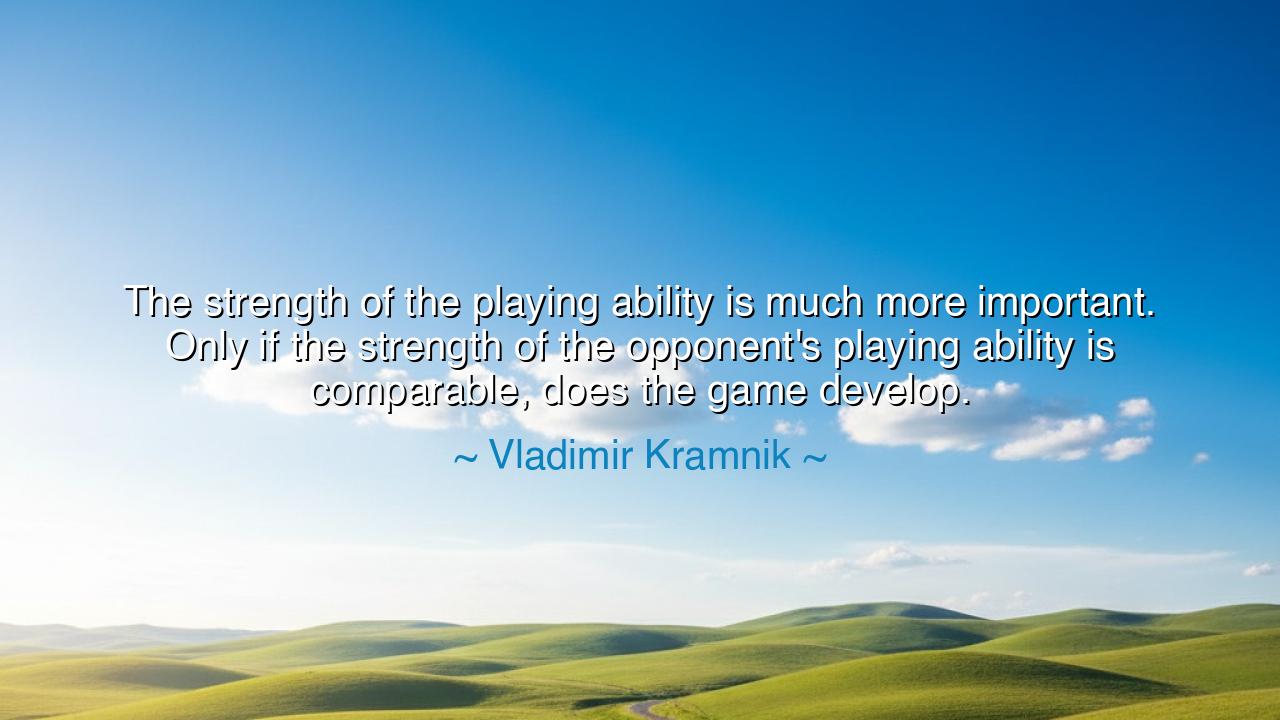
The strength of the playing ability is much more important. Only
The strength of the playing ability is much more important. Only if the strength of the opponent's playing ability is comparable, does the game develop.






Hear the words of Vladimir Kramnik, world chess champion and warrior of the mind, who declared: “The strength of the playing ability is much more important. Only if the strength of the opponent’s playing ability is comparable, does the game develop.” In this statement lies not only a reflection upon the art of chess, but also a universal truth about life, struggle, and growth. For it is only when we are tested by equals, only when we face resistance worthy of us, that we unfold our true power. Without such challenge, the game—whether of chess, of art, of war, or of life itself—remains shallow, undeveloped, incomplete.
In the realm of chess, Kramnik stood among giants, facing the likes of Garry Kasparov. Their duel in 2000 was more than a match; it was a battle of intellect, endurance, and willpower. Kramnik did not grow into greatness by defeating the weak, but by facing an opponent of terrifying strength, whose mastery forced him to discover new depths within himself. And so it has ever been: iron sharpens iron, and the contest of equals is the forge where true brilliance is struck.
The ancients too understood this law. In Homer’s Iliad, Achilles seeks out Hector, not for ease of conquest but because Hector alone can meet him in valor. Their duel was not only about death, but about the revelation of greatness—each man becoming more in the face of the other. The game of life, whether upon the battlefield or the chessboard, develops only when strength meets strength. Without the worthy adversary, one cannot rise to heroic stature; one merely drifts in mediocrity.
History abounds with such lessons. Consider the rivalry between Nikola Tesla and Thomas Edison. Their clash of ideas in the “War of Currents” forced each man to sharpen his vision, to refine his arguments, and to fight for his truth. Out of this fierce struggle emerged innovations that transformed the world. Had either faced no challenge, the brilliance of their minds might never have burned so brightly. For the strength of opposition is often the midwife of progress.
The meaning of Kramnik’s words, then, is clear: we need not fear the strong adversary; we must seek him. The weak opponent gives us comfort, but the strong one gives us growth. In every domain—whether in intellectual pursuits, creative endeavors, or moral battles—it is the resistance of equals or betters that calls forth our hidden greatness. Thus, the game of life develops only through challenge, through trial, through the testing of our true measure.
The lesson is this: do not flee from the strong, do not resent the rival who matches or surpasses you. Instead, embrace them as the catalyst of your development. Without such encounters, your abilities remain dormant, your spirit untested. It is only when your fire meets another’s fire that the blaze of mastery appears. Seek worthy contests, for in them lies the shaping of your destiny.
What, then, are the practical actions? Compete not with the weak for easy victories, but with the strong for noble growth. Surround yourself with teachers, rivals, and peers who challenge you to surpass yourself. When you feel the weight of struggle, remember that it is not a curse but a blessing, a sign that you are being drawn out of complacency into true greatness. And above all, welcome the adversary not as an enemy but as a hidden ally, the one through whom your own strength will be revealed.
Thus Kramnik’s words endure: “Only if the strength of the opponent’s playing ability is comparable, does the game develop.” Carry this wisdom within you, O seeker. For life itself is the greatest game, and its purpose is not to grant easy triumphs, but to give you challenges that awaken your highest powers. Seek not the path of ease, but the path of resistance—for it is there that your true self will rise.






AAdministratorAdministrator
Welcome, honored guests. Please leave a comment, we will respond soon